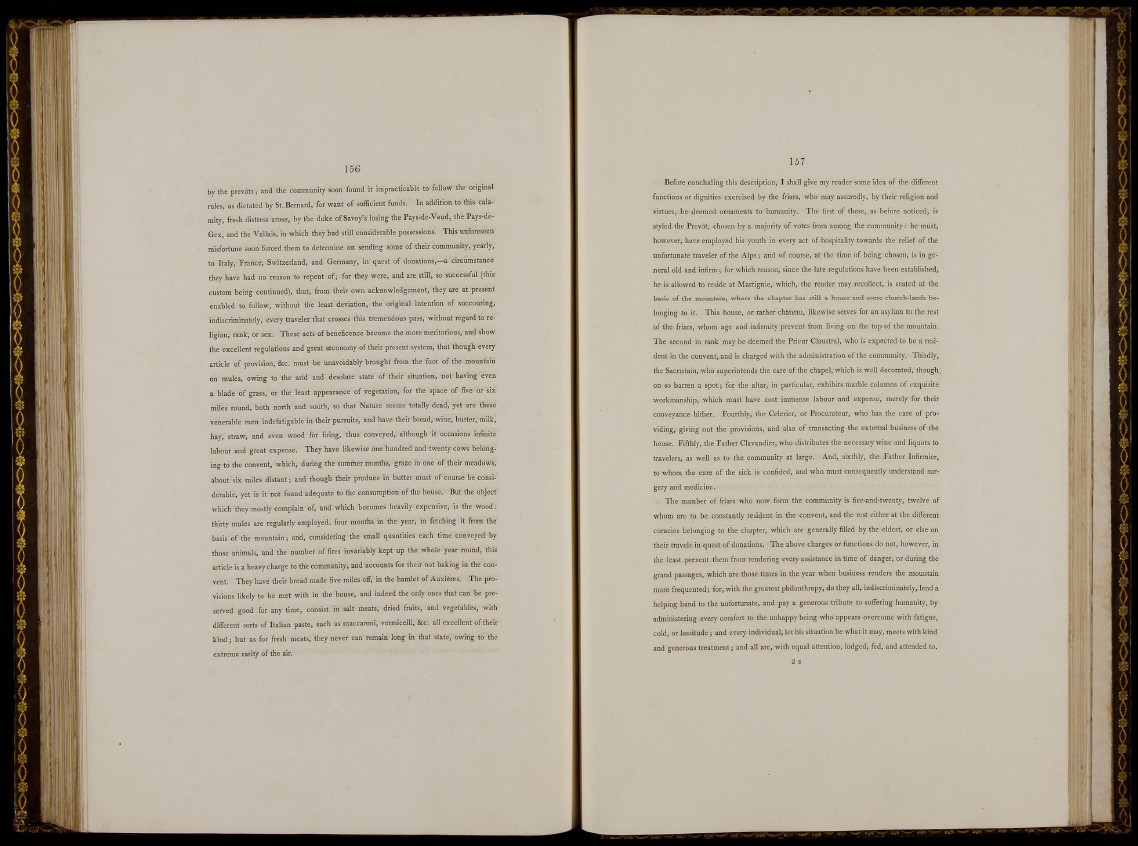
VM
by tlie prévôts; and the community soon found it impracticabie to follow the original
rules, as dictated by St. Bernard, for want of sufficient funds. In addition to this calamity,
fresh distress arose, by the duke of Savoy's losing the Pays-de-Vaud, the Pays-de-
Gex, and the Valíais, in which they had still considerable possessions. This unforeseen
misfortune soon forced them to determine on sending some of their community, yearly,
to Italy, France, Switzerland, and Germany, in quest of donations,—a circumstance
they have had no reason to repent of; for they were, and are still, so successful (this
custom being continued), that, from their ovrn acknowledgement, they are at present
enabled to follow, without the least deviation, the original intention of succouring,
indiscriminately, every traveler that crosses this tremendous pass, without regard to religion,
rank, or sex. These acts of beneficence become the more meritorious, and show
the excellent regulations and great oeconomy of their present system, that though every
article of provision, &c. must be unavoidably brought from the foot of the mountain
on mules, owing to the arid and desolate state of their situation, not having even
a blade of grass, or the least appearance of vegetation, for the space of five or six
mUes round, both north and south, so that Nature seems totally dead, yet are these
venerable men indefatigable in their pursuits, and have their bread, wine, butter, milk,
hay, straw, and even wood for firing, thus conveyed, although it occasions infinite
labour and great expense. They have likewise one hundred and twenty cows belonging
to the convent, which, during the summer months, graze in one of their meadows,
about six miles distant ; and though their produce in butter must of course be considerable,
yet is it not found adequate to the consumption of the house. But the object
which they mostly complain of, and which becomes heavily expensive, is the wood :
thirty mules are regularly employed, four months in the year, in fetching it from the
basis of the mountain ; and, considering the small quantities each time conveyed by
those animals, and the number of fires invariably kept up the whole year round, this
article is a heavy charge to the community, and accounts for their not baking in the convent.
They have their bread made five miles off", in the hamlet of Auxières. The provisions
likely to be met with in the house, and indeed the only ones that can be preserved
good for any time, consist in salt meats, dried fruits, and vegetables, with
diff'erent sorts of Italian paste, such as maccaroni, vermicelli, &c, all excellent of their
kind ; but as for fresh meats, they never can remain long in that state, owing to the
extreme rarity of the air.
Before concluding this description, I shall give my reader some idea of the different
functions or dignities exercised by the friars, who may assuredly, by their religion and
virtues, be deemed ornaments to humanity. The first of these, as before noticed, is
styled the Prévôt, chosen by a majority of votes from among the community : he must,
however, have employed his youth in every act of hospitality towards the relief of the
unfortunate traveler of the Alps; and of course, at the time of being chosen, is in general
old and infirm ; for which reason, since the late regulations have been established,
he is allowed to reside at Martignie, which, the reader may recollect, is seated at the
basis of the mountain, where the chapter has still a house and some church-lands belonging
to it. This house, or rather château, likewise serves for an asylum to the rest
of the friars, whom age and infirmity prevent from living on the top of the mountain.
The second in rank may be deemed the Prieur Claustral, who is expected to be a resident
in the convent, and is charged with the administration of the community. Tliirdly,
the Sacristain, who superintends the care of the chapel, which is well decorated, though,
on so barren a spot ; for the altar, in particular, exhibits marble columns of exquisite
workmanship, which must have cost immense labour and expense, merely for their
conveyance hither. Fourthly, the Celerier, or Procurateur, who has the care of providing,
giving out the provisions, and also of transacting the external business of the
house. Fifthly, the Father Clavandier, who distributes the necessary wine and liquors to
travelers, as well as to the community at large. And, sixthly, the Father Infirmier,
to whom the care of the sick is confided, and who must consequently understand surgery
and medicine.
The number of friars who now form the community is five-and-twenty, twelve of
whom are to be constantly resident in the convent, and the rest either at the different
curacies belonging to the chapter, which are generally filled by the eldest, or else on
their travels in quest of donations. The above charges or functions do not, however, in
the least prevent them from rendering every assistance in time of danger, or during the
grand passages, which are those times in the year when business renders the mountain
more frequented ; for, with the greatest philanthropy, do they all, indiscriminately, lend a
helping hand to the unfortunate, and pay a generous tribute to sufl^ering humanity, by
administering every comfort to the unhappy being who appears overcome with fatigue,
cold, or lassitude ; and every individual, let his situation be what it may, meets with kind
and generous treatment ; and all are, with equal attenrion, lodged, fed, and attended to.
.(•¡11'l
iii 1
III].;'.:.
l î q
i l : "